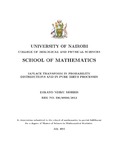| dc.description.abstract | Transforms such as generating functions, Laplace transform, Mellin transform and Fourier transforms are very useful tools in probability distributions and stochastic processes. The objective of this work is to use Laplace transform in constructing continuous probability distributions and/or obtaining their properties. These distributions and their properties have been expressed explicitly in some cases and in terms of modified Bessel functions of third kind in other cases. Distributions based on sum of independent random variables have been constructed. Mixed probability distributions, in particular Poisson and exponential mixtures have been studied.
Probability distributions emerging from birth processes have also been obtained. The pure birth processes considered are Poisson, simple birth, simple birth with immigration and Polya processes. Laplace transform has been applied in solving the basic difference differential equations for each of the special cases.
Two approaches were considered, first the Laplace transform was applied to the basic difference differential equations directly, this yielded a general expression for Pn(t) after which both the complex inversion formula and the Partial fractions method were used in determining the inverse Laplace transform to obtain the underlying distributions.
Secondly the Probability generating function technique was used and then Laplace transform was applied to the resulting ODE/PDE . In the cases of simple birth, simple birth with immigration and Polya processes two techniques were used to solve the ODE obtained, one was using the Dirac delta function whereas the second technique involved the use of the Gauss hyper geometric function. The different approaches yielded the same results. For the case of Poisson process a Poisson distribution with parameter λt was obtained.
iv
In simple birth process the negative binomial distribution with parameters r = n0 and p = e−λt was obtained when the initial population X(0) is n0.When the initial population X(0) is 1 a shifted geometric distribution with parameters p = e−λt was obtained.
In the case of simple birth with immigration where v is the immigration rate the negative binomial distribution with parameters r = n0 + v λ and p = e−λt was obtained when the initial population X(0) is n0 whereas for the case where the initial population is 1 the negative binomial distribution with parameters r = 1 + v λ and p = e−λt was obtained.
In the case of the Polya process both methods yielded a negative binomial distribution although the parameters differed.When the initial population was considered to be no, applying Laplace transform to the finite difference differential equations yielded a negative binomial distribution with parameters r = n0 + 1 a and p = e− λat 1+λat whereas applying Laplace transform to the differential equations based on probability generating function the parameters were obtained as r = n0 + 1 a and p = λat 1+λat. When the initial population was assumed to be 1, applying Laplace transform to the finite difference differential equations yielded a negative binomial distribution with parameters r = 1+ 1 a and p = e− λat 1+λat whereas applying Laplace transform to the differential equations based on probability generating function the parameters were obtained as r = 1 + 1 a and p = λat 1+λat. | en_US |



